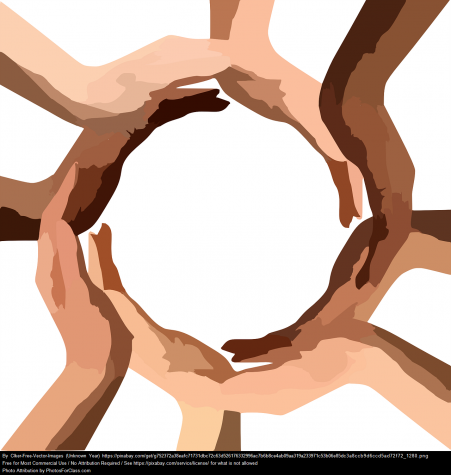In Defense of Sitting During the Pledge
“Je promets ma fidélité au drapeau des États-Unis d ́Amérique et à la République qu’il représente, une nation sous Dieu, indivisible, avec liberté et justice pour tous.”
In my French III class last year, we recited the Pledge of Allegiance every day. Or at least we were supposed to. By
the end of the year, only a few students were standing up. This is a phenomenon that has become increasingly common over the past four years. I myself haven’t stood for the pledge since I was a freshman. But this lends itself to the question: why?
Many students feel that the pledge represents a promise unmet, a sentiment similar to the one behind former football player Colin Kaepernick’s famous protest of the national anthem. When asked why he kneeled for the anthem, Kaepernick cited his lack of pride “in a flag for a country that oppresses Black people and people of color.”
The idea behind sitting during the pledge is the same for many of these students, especially as our country grows more aware of police brutality and other forms of structural racism in this country. Why should we stand for the flag of a country that, since its inception, has continued to systematically oppress people of color, women, the LGBTQ+ community, and other marginalized groups? How can we attest to an America “with liberty and justice for all” in good faith when it so clearly does not exist?
Others feel that it’s hypocritical that a country founded on the basis of freedom of speech should mandate students to blindly recite allegiance to a country, day in and day out, without any understanding of what they are swearing to. To many, it feels less like a display of patriotism and more like a form of indoctrination.
Many students also have legitimate objections to the use of the words “under God” in a state-imposed ritual. As a Jewish person, I am included in this camp. America, despite its claims of church-state separation, has always been influenced by Christianity—I know which god is being discussed here, and it certainly isn’t mine. And nor should it be; after all, even if we argue that this anonymous God could represent a deity of any religion, where does that leave atheists?
Although it has been argued that these words do not represent a religious exercise in this context, I would argue the opposite. The words “under God” were first added to the pledge during the Cold War, when fears of Soviet-style atheism were sweeping the nation, and the addition of “under God” seemed a natural way to instill what Eisenhower referred to as “the Almighty”—and therefore, capitalism—in the hearts of American children.
These students who have conscientiously objected to standing for the pledge for these reasons have often been met with censure; since the first legal dispute over the pledge in 1940, when two Jehovah’s Witnesses were forced to stand up despite religious objections, there have been a multitude of court cases involving students who have faced ridicule or discipline for choosing to stay seated.
I can also attest to this on a personal level. Last year, during a school assembly, I sat during the national anthem. This is pretty routine for me; I started this practice when I stopped standing for the pledge. Then something happened.
“You’re supposed to stand for the anthem,” said one of the boys sitting behind me. I heard his friends agree.
Fine, whatever. I didn’t turn around.
But then it got ugly. They started swearing at me, calling me names—I won’t repeat them here because they certainly weren’t school appropriate. This continued for the entire song. I still didn’t turn around. This incident has been on the back of my mind for a while. Is this the respect with which you treat others when they exercise their right to protest? Are you so attached to the idea of a virtuous, flawless America that you are unwilling to accept any form of criticism towards it?
Nobody is saying that you have to sit down for the Pledge of Allegiance. If you find meaning in this ritual—if you feel that it is a legitimate way to honor your love of country, if you feel it represents a promise for a better tomorrow, or if you simply don’t like standing out in a crowd—then so be it.
But what I am saying is that those who sit down have a reason. It has become clear in recent years that we are not one nation. We are fractured, we are divided. We are not under one God, and nor should we be, because America is made beautiful through its diversity. It feels hypocritical to stand for a pledge that supposedly promises liberty and justice in an America so fraught with inequality.
This form of protest is a legitimate one, and if you cannot recognise even such innocuous forms of civil resistance, then do not be surprised when they take on a more powerful shape. Kneeling on a field or ignoring these words over the loudspeaker—as is our First-Amendment-given right to do so—harms nobody.
Choosing to engage with these words, to grapple with their meanings instead of mindlessly defending them is in the exact spirit of the civil debate that the First Amendment grants us. And I, like many other students, won’t stand for the pledge until I live in an America that truly represents its message.






